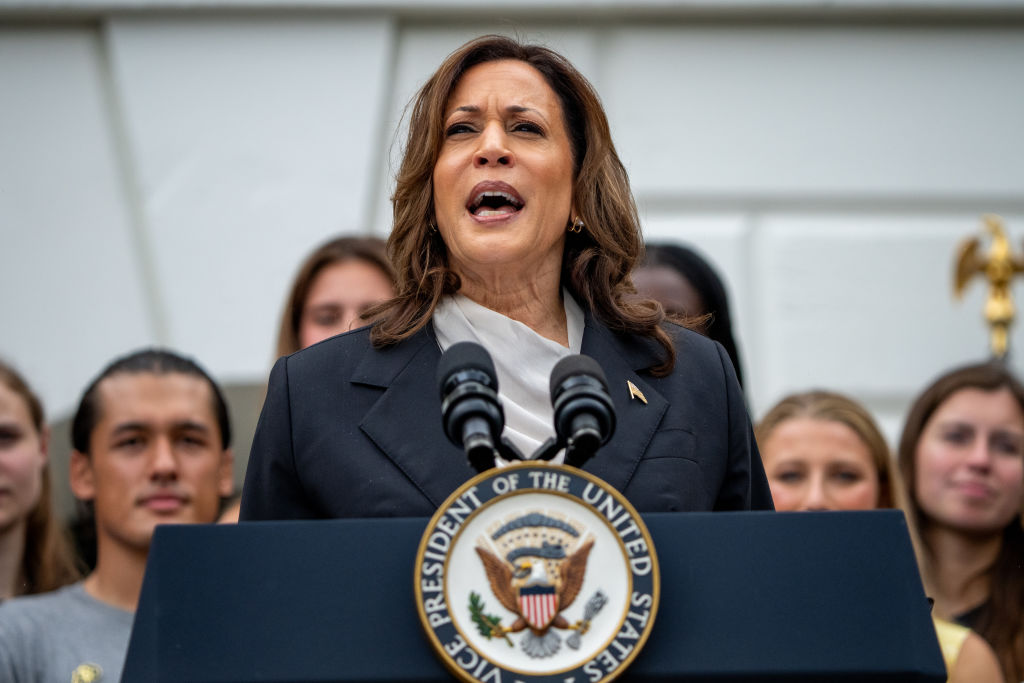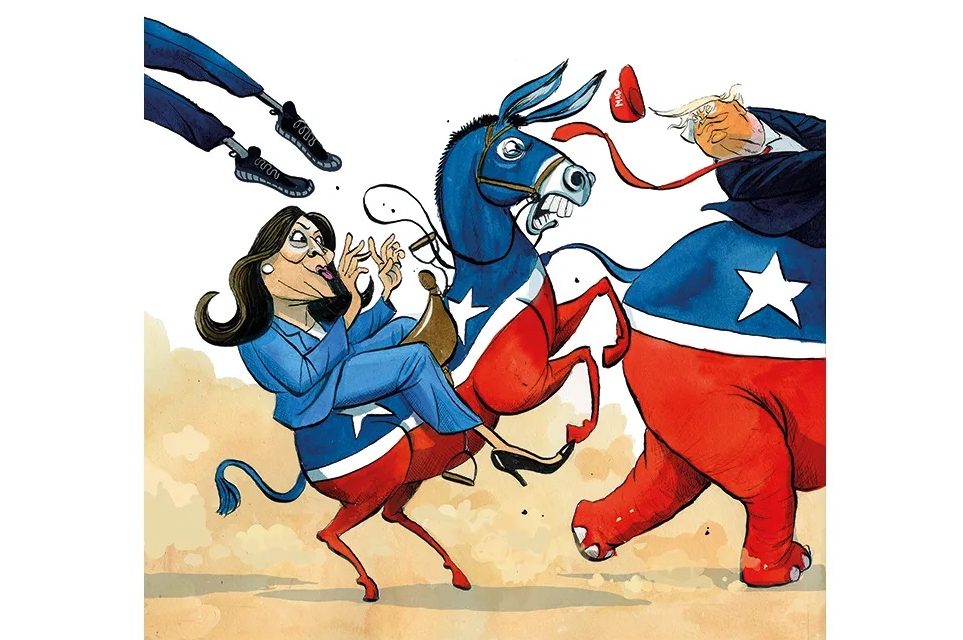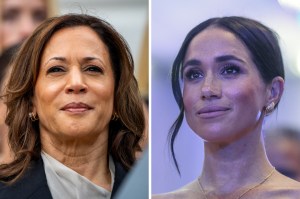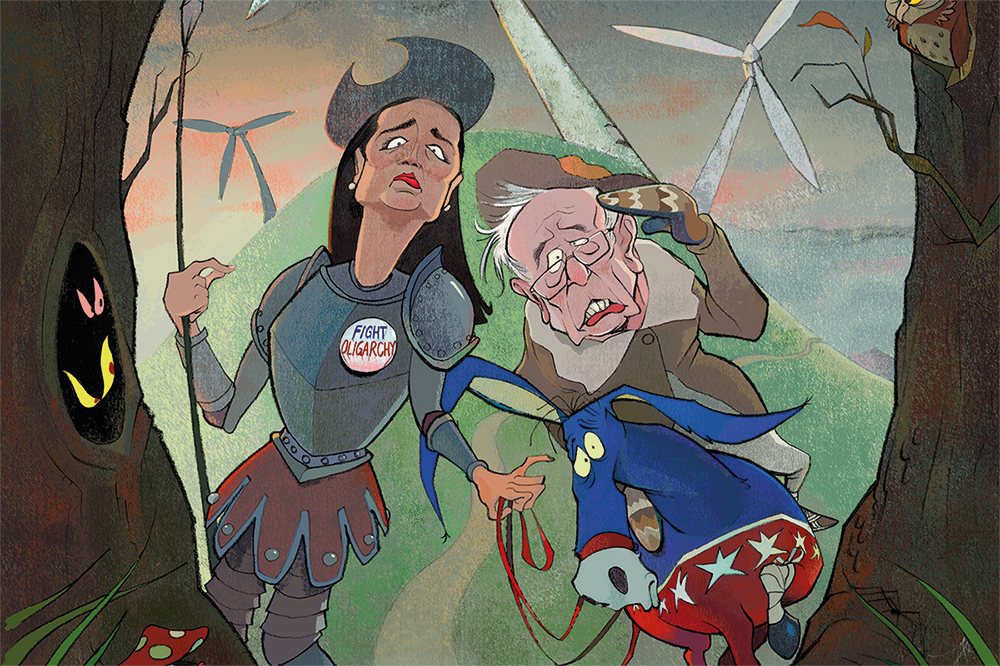“I’m struck just in your presence,” a news anchor gushed to Kamala Harris in January. The vice president beamed, nodding for her interviewer to continue. “You hear candidates suggesting that a vote for President Biden, because of his age, is a vote for you.” The reporter paused: “And that is hurled as an insult.”
Harris explained that this is the price women pay for professional success — in her case, rising from first female attorney general in California to state senator to vice president. “I love my job,” Harris concluded, wrapping up the kind of hard-hitting interview the media tends to throw her way.
Insult or not, the suggestion that a vote for Biden was a vote for Harris turned out to be true. The president’s decision to withdraw his campaign 107 days out from polling day — followed by a glowing endorsement for his VP — ensured Harris’s ascendency to the top of the ticket. A series of Zoom meetings this week have nearly finalized the process, which will see delegates confirm Harris as the presidential nominee next month at the Democratic National Convention in Chicago.
It’s a remarkable rise in just four years. In early 2020 Harris was recovering from her botched run for president. Then a junior senator, her polling among fellow Democrats had been down in the single digits, so in December 2019 she pulled out of the primaries before the first ballots were cast. Now, in a matter of weeks, only Donald Trump stands in the way of her being elected to the most powerful job in the world.
Harris and Biden never fell into the same political camp until they were on the same ballot
It’s a serendipitous position for the vice president. What might she do with it?
“I love you, Joe,” Harris said down the line to the president during her first rally on Monday, speaking to campaign staff in Delaware. “I’m watching you, kid. I love you,” Biden’s voice muttered on the speaker. It’s good to know they have eyes on each other — Americans did not see the president for days after he resigned his campaign on social media. Harris and Biden are working hard to establish her as the continuity candidate, the Democrat who can beat Trumpism as Biden did. But the pair never fell into the same political camp until they were on the same ballot. During the 2020 primaries they sparred over the rule of law. On Harris’s plan to issue executive orders to curb gun rights, she urged Biden: “Instead of saying ‘no we can’t,’ let’s say ‘yes we can.’” “Let’s be constitutional,” he retorted. Harris also suggested that Biden was soft on racism — a claim he rejected.
Biden was selected as the Democratic candidate precisely because of his moderate leanings. It was Harris who had to pivot to the center. Yet her political history is chock-full of radical policies on the left and right. Harris was ranked the most left-leaning Democratic senator in America in 2020 — prior to that, she was supporting Bernie Sanders’s plans for single-payer healthcare and the abolition of private health insurance. She was also co-sponsoring the Green New Deal resolution advocated by democratic socialist “Squad” leader Alexandria Ocasio-Cortez — a minimum $10 trillion blueprint to overhaul the American economy.
Yet these impeccable left-wing credentials, which Harris tried to play up during the 2020 primaries, have always been muddied by her record as district attorney in San Francisco and then attorney general of California. She prosecuted parents with truant kids, and used non-violent drug crimes to increase conviction rates. Harris didn’t simply lock people up — she seemed to get a kick out of it. She’s made jokes about prisoners begging for food and water and compared their experience to hers on the campaign trail.
Her “Kamala Cop” reputation harmed her appeal on the party’s left in 2020. Now she’s all but secured the nomination, however, her campaign is eager to re-establish her “law and order” reputation for 2024.
But for now, progressive Democrats clearly think that her instincts align with theirs, which is why they’ve been so quick to endorse her. There’s a sense, too, that Harris will shake up conventional foreign policy. She is expected to keep to Biden’s supportive stance on Ukraine. Yet she has been more outspoken on the death toll in Gaza, leading some in her party to think she could adopt a tougher stance on Israel. It’s been noticed that Harris skipped Benjamin Netanyahu’s address to Congress this week in order to attend a speaking engagement turned campaign rally in Indiana instead.

Harris wants to stick to talking about domestic policy in the coming months. She’ll focus on one issue above all: abortion. Already framing this as the campaign that will either secure or abolish women’s reproductive rights, Harris is looking to sweep up the votes in right-leaning and swing states that have been voting to keep some level of abortion access in place since the overturn of Roe v. Wade.
In response, the Republicans are bound to draw attention to her big assignment from Biden: to unearth and tackle the “root causes” of illegal migration at the US-Mexico border. It hasn’t gone well. The vice-president made a trip to El Paso in 2021 — then largely turned a blind eye to the chaos that ensued. The trip came after she was pressed by NBC News over why she hadn’t been to visit the border. “I haven’t been to Europe,” she replied. “I don’t understand the point you’re making.”
Democrats won’t say out loud that she would never be the nominee were it not for extraordinary circumstances
It’s those kinds of zingers that have surely secured her countless endorsements from the Democratic establishment. George Orwell once said that political language is designed to give “an appearance of solidity to pure wind.” Harris doesn’t play that game. Usually, it’s just wind. “When we talk about the children of the community, they are a children of the community,” she said at the Children’s National Hospital in Washington, DC, giving remarks on mental health. Sometimes the gusts of her rhetoric blow her somewhere unexpected. “I just love Venn diagrams,” she explained at an event in 2022. “It’s just something about those three circles, the analysis about where there is the intersection. Right?” She brings up her passion for these diagrams frequently.
For others, Harris is not necessarily the ideal Biden replacement but the most obvious and easiest one. Her name recognition gives her an advantage over other contenders — and will help her against Trump, the most famous politician on the planet. Lawyers can stop bickering over whether the $100 million war chest built up for Biden could still be accessed by whoever replaced him. It’s all been transferred straight to Harris 2024 (though Trump’s team is fighting it).
Most importantly, Harris has the strongest claim to a mandate. In the Democratic presidential primaries this year the vast majority cast their ballot for the Biden-Harris ticket. The idea of selecting a candidate with no votes behind their name — in an election year when the Republican nominee insists that the 2020 outcome was “rigged” — seemed to many an unnecessary own goal.
What Democrats can’t bring themselves to say out loud is that Harris would never be the nominee were it not for extraordinary circumstances. Polls suggest she has been one of the least popular vice presidents in modern history; she’s as unpopular as Trump.
For now, she has brought life back into the Democratic bid to keep the presidency. But that was a low bar. Meanwhile, there is an uneasy parallel to the Republican campaign: like Trump, Harris is about to get another shot at replaying the 2020 outcome. For both candidates, it is not yet obvious that voters have changed their minds.
In one of Harris’s viral speeches, the vice-president paid particular attention to the passage of time. “The governor and I were… talking about the significance of the passage of time. Right, the significance of the passage of time. So when you think about it, there is great significance to the passage of time,” she reflected while speaking about high-speed broadband in Louisiana.
Perhaps she was really thinking about her own ascendancy. Her rise makes as much sense as that statement. But it has great significance for America.
This article was originally published in The Spectator’s UK magazine. Subscribe to the World edition here.


























Leave a Reply